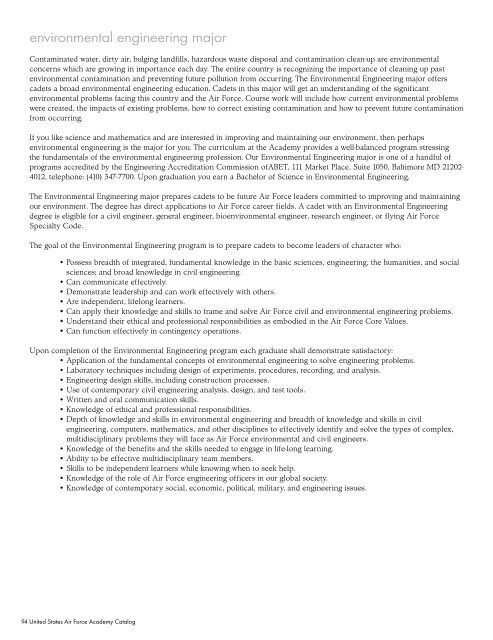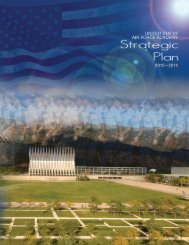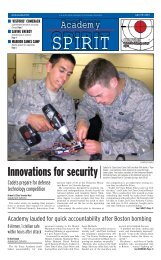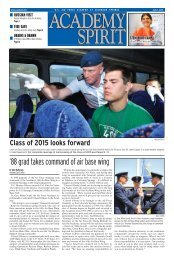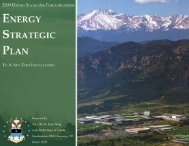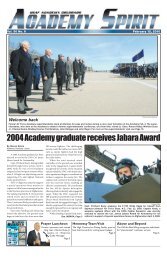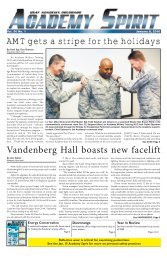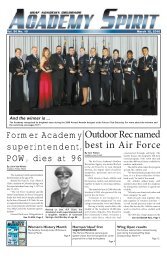2008-2009 Catalog - United States Air Force Academy
2008-2009 Catalog - United States Air Force Academy
2008-2009 Catalog - United States Air Force Academy
You also want an ePaper? Increase the reach of your titles
YUMPU automatically turns print PDFs into web optimized ePapers that Google loves.
environmental engineering major<br />
Contaminated water, dirty air, bulging landfills, hazardous waste disposal and contamination clean-up are environmental<br />
concerns which are growing in importance each day. The entire country is recognizing the importance of cleaning up past<br />
environmental contamination and preventing future pollution from occurring. The Environmental Engineering major offers<br />
cadets a broad environmental engineering education. Cadets in this major will get an understanding of the significant<br />
environmental problems facing this country and the <strong>Air</strong> <strong>Force</strong>. Course work will include how current environmental problems<br />
were created, the impacts of existing problems, how to correct existing contamination and how to prevent future contamination<br />
from occurring.<br />
If you like science and mathematics and are interested in improving and maintaining our environment, then perhaps<br />
environmental engineering is the major for you. The curriculum at the <strong>Academy</strong> provides a well-balanced program stressing<br />
the fundamentals of the environmental engineering profession. Our Environmental Engineering major is one of a handful of<br />
programs accredited by the Engineering Accreditation Commission ofABET, 111 Market Place, Suite 1050, Baltimore MD 21202-<br />
4012, telephone: (410) 347-7700. Upon graduation you earn a Bachelor of Science in Environmental Engineering.<br />
The Environmental Engineering major prepares cadets to be future <strong>Air</strong> <strong>Force</strong> leaders committed to improving and maintaining<br />
our environment. The degree has direct applications to <strong>Air</strong> <strong>Force</strong> career fields. A cadet with an Environmental Engineering<br />
degree is eligible for a civil engineer, general engineer, bioenvironmental engineer, research engineer, or flying <strong>Air</strong> <strong>Force</strong><br />
Specialty Code.<br />
The goal of the Environmental Engineering program is to prepare cadets to become leaders of character who:<br />
• Possess breadth of integrated, fundamental knowledge in the basic sciences, engineering, the humanities, and social<br />
sciences; and broad knowledge in civil engineering.<br />
• Can communicate effectively.<br />
• Demonstrate leadership and can work effectively with others.<br />
• Are independent, lifelong learners.<br />
• Can apply their knowledge and skills to frame and solve <strong>Air</strong> <strong>Force</strong> civil and environmental engineering problems.<br />
• Understand their ethical and professional responsibilities as embodied in the <strong>Air</strong> <strong>Force</strong> Core Values.<br />
• Can function effectively in contingency operations.<br />
Upon completion of the Environmental Engineering program each graduate shall demonstrate satisfactory:<br />
• Application of the fundamental concepts of environmental engineering to solve engineering problems.<br />
• Laboratory techniques including design of experiments, procedures, recording, and analysis.<br />
• Engineering design skills, including construction processes.<br />
• Use of contemporary civil engineering analysis, design, and test tools.<br />
• Written and oral communication skills.<br />
• Knowledge of ethical and professional responsibilities.<br />
• Depth of knowledge and skills in environmental engineering and breadth of knowledge and skills in civil<br />
engineering, computers, mathematics, and other disciplines to effectively identify and solve the types of complex,<br />
multidisciplinary problems they will face as <strong>Air</strong> <strong>Force</strong> environmental and civil engineers.<br />
• Knowledge of the benefits and the skills needed to engage in life-long learning.<br />
• Ability to be effective multidisciplinary team members.<br />
• Skills to be independent learners while knowing when to seek help.<br />
• Knowledge of the role of <strong>Air</strong> <strong>Force</strong> engineering officers in our global society.<br />
• Knowledge of contemporary social, economic, political, military, and engineering issues.<br />
94 <strong>United</strong> <strong>States</strong> <strong>Air</strong> <strong>Force</strong> <strong>Academy</strong> <strong>Catalog</strong>


